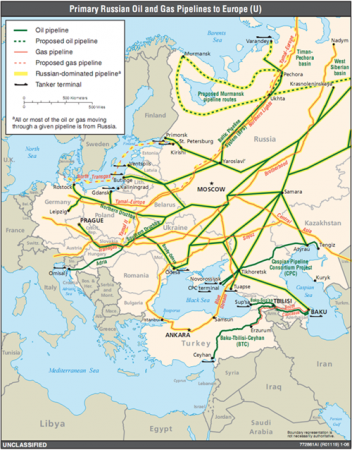One of the most important levers through which Russia can exert pressure on Western European states is by controlling the flow of fossil fuels. As illustrated below, oil and gas pipelines originating in Russia are critical energy lifelines for the rest of Europe:
When Russia turns off the taps – as it sometimes does to put pressure on states like Ukraine – people can find themselves shivering in the cold. This could become even more problematic if pipelines like Nord Stream which circumvent Eastern Europe are completed. Then, Russia will be able to cut off states like Georgia, Ukraine, and Poland without denying fuels to France and Germany.
At the moment, it seems that European states are becoming ever-more dependent on Russia for energy. Partly, that has been the consequence of relying more on gas for electrical power. A recently leaked German report on peak oil highlights the geopolitical dangers associated with dependence on Russian oil and gas. At present, Russia supplies about 35% of German oil imports, along with 37% of natural gas.
In the medium- to long-term, Europe has an opportunity to achieve two major objectives by switching to zero-carbon forms of electricity generation and transport. They can reduce the severity of environmental problems: especially climate change, but also air pollution. At the same time, they can reduce the power that Russia holds over them, and increase their freedom to make policy on Eastern Europe in a more principled way.
One promising alternative is the massive deployment of concentrating solar power stations around the Mediterranean and North Africa, with high voltage direct current transmission lines to bring the electricity to Europe.

Europe’s gas pipelines
The abominable gas man
How technological change and new pipelines improve energy security
Oct 14th 2010
FOR years, the idea that Europe might get gas from the Caucasus and beyond, breaking Russia’s monopoly on east-west pipelines, seemed fanciful. Not any more. The leading contender, the Nabucco pipeline, backed by the European Union, is gaining speed (see map). Last month the project won $5 billion in loans from the World Bank, the European Investment Bank and the European Bank for Reconstruction and Development.
Nabucco is not yet a done deal. Two big members of the consortium, RWE of Germany and OMV of Austria, said on October 8th that they had postponed to next year a final decision on whether to invest. RWE would like to build the Turkish part of the project. But Turkey is considering a public tender in which local firms would get a share of the cake. Any slowdown may raise the pressure on the EU to shoulder more of the risk itself.
Another problem is the source of gas. At first Nabucco needs 8 billion cubic metres (bcm) a year from Azerbaijan, but it wants a lot more to be fully viable. Turkmenistan is the best option: it has fallen out with Russia, thawed relations with Azerbaijan, and built a pipeline from its onshore gasfields to the Caspian coast. Gas could continue from there either by a pipeline across the Caspian (though Russia objects) or, more cumbersomely, by tanker.
Nabucco is not the only party interested in Azeri gas. The authorities in Baku continue to flirt with Russia (though any pipeline going northward would have to cross the unstable north Caucasus). Two rival projects aim to bring Azeri gas to southern Italy via Turkey and Greece. That would not help gas-hungry central Europe. But the costs and politics of the Adriatic route are simpler.
fully developed working alternate energy systems where developed and made operational in the 20’s and 30’s . these could have implimented or solved the current energy crisis today. the oil companies had the clout , the money and the power to stop productive research on self sufficient energy projects . the products and developments of the 20’s and 30’s are as functional and viable now as they where then . then the question arises who is stopping there implimentation into the world markets.